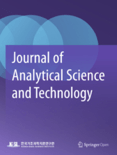
Journal of Analytical Science and Technology
Scope & Guideline
Advancing the Frontiers of Analytical Science and Technology
Introduction
Aims and Scopes
- Analytical Method Development:
The journal emphasizes the creation and validation of innovative analytical techniques, including chromatographic, spectroscopic, and electrochemical methods, aimed at improving detection limits and analytical performance. - Environmental and Biological Analysis:
Research published in the journal frequently addresses the analysis of environmental samples and biological matrices, highlighting the importance of trace analysis in assessing environmental health and biological responses. - Nanotechnology in Analytics:
A significant focus on the application of nanomaterials in analytical chemistry is evident, particularly in the development of sensors and probes for detecting biological and chemical substances. - Interdisciplinary Approaches:
The journal promotes interdisciplinary research, where analytical chemistry intersects with fields such as biology, medicine, environmental science, and materials science, reflecting the diverse applications of analytical technologies. - Quality Assurance and Standardization:
There is a consistent emphasis on the importance of quality assurance in analytical methods, including the development of certified reference materials and standardized methods for accurate and reliable measurements.
Trending and Emerging
- Advanced Spectroscopic Techniques:
There is an increasing trend towards utilizing advanced spectroscopic methods, such as NMR and mass spectrometry, particularly in complex biological and environmental analyses, showcasing the journal's alignment with cutting-edge scientific advancements. - Micro and Nanotechnology Applications:
Research on micro and nanotechnology for analytical applications is gaining traction, with studies focusing on the development of nanosensors and microextraction techniques, indicating a shift towards miniaturized and efficient analytical systems. - CRISPR and Genetic Analysis:
The emergence of CRISPR-based methodologies for sensitive detection of biomolecules, particularly in medical diagnostics, reflects a growing interest in genetic analysis techniques within the journal's scope. - Sustainable and Green Analytical Methods:
There is a notable increase in studies dedicated to sustainable and eco-friendly analytical methods, highlighting the community's commitment to reducing the environmental impact of analytical processes. - Data-Driven Analytical Approaches:
The integration of artificial intelligence and machine learning in analytical chemistry is trending, with a focus on data analysis, predictive modeling, and automation of analytical processes, indicating a shift towards data-centric methodologies.
Declining or Waning
- Traditional Analytical Techniques:
There has been a noticeable decrease in the publication of papers focusing on conventional analytical methods, such as basic spectrophotometry and classic titration techniques, as researchers increasingly adopt more advanced methodologies. - Generalized Clinical Applications:
Research that broadly addresses clinical applications without a specific analytical innovation has diminished, possibly due to a growing preference for studies that integrate novel technologies or address specific clinical questions with advanced methods. - Basic Material Characterization:
Papers focusing solely on the characterization of materials without a strong analytical or application-driven context are less common, indicating a shift towards more application-oriented research that connects material properties to practical uses.
Similar Journals
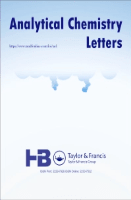
Analytical Chemistry Letters
Connecting Theory to Practice in Analytical ResearchAnalytical Chemistry Letters is a notable journal published by Taylor & Francis Ltd, focusing on the interdisciplinary aspects of analytical chemistry and its applications across various fields, including materials science and forensic medicine. With an ISSN of 2229-7928 and an E-ISSN of 2230-7532, this journal provides researchers and professionals a platform to share their findings from 2011 to 2024, fostering advancements in methodologies and technologies. Despite being classified in the Q3 and Q4 category quartiles across multiple disciplines, the journal is crucial for emerging studies and discussions, particularly in the context of innovative analytical techniques and their relevance to real-world challenges. While currently not an open-access journal, its rigorous peer-review process ensures high-quality contributions that are essential for academics, professionals, and students keen on bridging theory and practice. The journal continues to build its reputation, reflected in its Scopus rankings which place it amidst a competitive landscape, encouraging growth and collaboration within the scientific community.

Analytical and Bioanalytical Chemistry Research
Advancing the Frontiers of Analytical Chemistry.Analytical and Bioanalytical Chemistry Research is an esteemed open-access journal published by the Iranian Chemical Society, dedicated to the advancement of knowledge in the fields of analytical chemistry, biochemistry, and spectroscopy. Since its inception in 2014, this journal has provided a platform for researchers, professionals, and students to publish and access high-quality research articles that contribute to the understanding of chemical analysis and bioanalytical methods. With an ISSN of 2383-093X and an open-access model that promotes global dissemination of findings, it ensures that innovative research reaches a broad audience. The journal has consolidated its presence in the scientific community, currently ranked in quartile Q4 for analytical chemistry, biochemistry, and spectroscopy as of 2023. Its Scopus rankings, including a percentile of 34th in Analytical Chemistry, reflect its commitment to quality research and scholarly contribution. Situated in Tehran, Iran, the journal serves as a vital resource for academic discourse, offering insights into emerging trends and methodologies in analytical and bioanalytical chemistry.

TALANTA
Leading Discoveries in Spectroscopy and BiochemistryTALANTA, published by Elsevier, is a premier international journal that serves as a vital platform in the field of analytical chemistry. Since its inception in 1958, TALANTA has provided a comprehensive forum for the dissemination of groundbreaking research and developments in chemical analysis, spanning a wide array of topics including biochemistry and spectroscopy. With an impressive impact factor and ranking in the Q1 quartile within its category for 2023, it is ranked #12 out of 156 journals in Analytical Chemistry by Scopus, placing it among the most influential journals in its field. Researchers, professionals, and students benefit from its stringent peer-review process and high-quality content that drives advancements in analytical methodologies and applications. TALANTA's commitment to fostering innovation and excellence in research makes it an indispensable resource for anyone at the forefront of scientific inquiry.
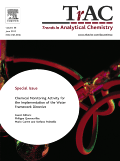
TRAC-TRENDS IN ANALYTICAL CHEMISTRY
Transforming Research into Impactful SolutionsTRAC - Trends in Analytical Chemistry is a prestigious journal published by Elsevier Science Ltd, situated in the Netherlands. With an impressive impact factor reflected in its Q1 rankings across three major categories—Analytical Chemistry, Environmental Chemistry, and Spectroscopy—this journal stands at the forefront of disseminating pioneering research and advancements in the field of analytical chemistry. Established in 1981, TRAC provides a comprehensive platform for researchers to share influential studies and insights related to the latest trends, methodologies, and technologies in analytical techniques. Recognized globally, the journal excels in fostering cross-disciplinary dialogue and innovation, making it an indispensable resource for academics, professionals, and students alike. Explore the latest issues to stay abreast of cutting-edge developments that shape the analytical sciences.
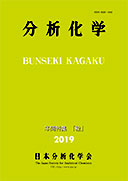
BUNSEKI KAGAKU
Empowering the Next Generation of ChemistsBUNSEKI KAGAKU, published by the Japan Society Analytical Chemistry, is a reputable journal dedicated to the field of analytical chemistry. With an ISSN of 0525-1931, this journal has been a crucial outlet for scholarly communication since its inception in 1952, converging its publication years from 1954 to 1957 and from 1959 to 2024. Although it holds a Q4 category ranking in the most recent 2023 quartiles of analytical chemistry and ranks 153/156 in Scopus, it continues to serve as a platform for quality research, fostering advancements in the field. BUNSEKI KAGAKU is based in Tokyo, Japan, and emphasizes the critical importance of analytical techniques in scientific inquiry. With a commitment to professionalism and rigor, the journal provides a vital resource for researchers, students, and professionals seeking to explore innovative methodologies and contribute to the ongoing dialogue in analytical chemistry.
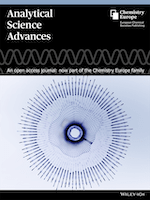
Analytical Science Advances
Pioneering Research for Tomorrow's Analytical ChallengesAnalytical Science Advances is a dynamic journal published by WILEY, dedicated to the ever-evolving field of analytical chemistry. With an ISSN of 2628-5452, this open-access platform aims to disseminate high-quality research and insightful reviews that push the boundaries of analytical methodologies and instrumentation. Since its inception in 2020, the journal has gained traction, securing a commendable Q2 ranking in 2023 within its category, highlighting its significance in the scientific community. Currently positioned at Rank #68 out of 156 in Scopus' analytical chemistry category, it boasts a 56th percentile ranking, reflecting its contributions to advancing analytical techniques. Researchers, professionals, and students will find this journal an invaluable resource for keeping abreast of the latest developments, emerging technologies, and innovative approaches in analytical science, ensuring the journal's relevancy and influence in shaping future discoveries.

Journal of Chemical Metrology
Pioneering Research in Spectroscopy and ElectrochemistryJournal of Chemical Metrology is a vital resource in the evolving fields of Analytical Chemistry, Electrochemistry, Spectroscopy, and Toxicology, published by ACG PUBLICATIONS in Turkey. With a focus on advancing the understanding and application of chemical metrology, this journal aims to bridge gaps in quantitative analysis, offering researchers and professionals a platform to disseminate groundbreaking studies and methodologies. Although it operates under a traditional access model, readers can benefit from its insights as the journal continues to gain recognition with its 2023 rankings placing it in the Q3 and Q4 categories across various scientific disciplines. From its inception in 2019 to its projected convergence in 2024, the journal has been instrumental in fostering collaboration and innovation in chemical sciences, making it an essential tool for students and researchers dedicated to enhancing analytical techniques and ensuring safety through effective toxicological assessments.
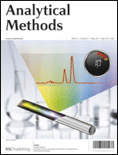
Analytical Methods
Exploring the Depths of Analytical ChemistryAnalytical Methods, published by the renowned Royal Society of Chemistry, is a distinguished journal that has been serving the scientific community since its inception in 2009. Specializing in the fields of Analytical Chemistry, Chemical Engineering, and General Engineering, this journal holds a reputable position with an impressive Q2 ranking in three relevant categories as of 2023. With its focus on innovative methodologies and advanced applications in analytical science, it aims to disseminate cutting-edge research and foster dialogue among researchers, professionals, and students. Although it is not an open access publication, it is accessible worldwide and provides critical insights into the latest developments in analytical techniques and their engineering applications. The journal also ranks highly in pertinent Scopus categories, such as being in the 77th percentile for General Engineering and 61st percentile for Analytical Chemistry, underlining its significance in advancing knowledge and practical applications in these fields. By participating in this journal, readers can expect to engage with high-quality research that influences the future of analytical practices and chemical engineering.
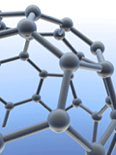
Annual Review of Analytical Chemistry
Elevating Research Through Comprehensive ReviewsAnnual Review of Analytical Chemistry, published by Annual Reviews, is a premier journal that serves as a critical resource in the field of analytical chemistry, providing comprehensive and cutting-edge reviews that synthesize recent advancements and pivotal research findings. With an impressive impact factor and ranked Q1 in both Analytical Chemistry and Miscellaneous Medicine, it stands as a leader in disseminating knowledge that spans the intricacies of chemical analysis, enhancing the scientific discourse within the community. Available in both print (ISSN: 1936-1327) and online (E-ISSN: 1936-1335), the journal is accessible to a wide audience, fostering innovation and collaboration among researchers, professionals, and students alike. Its scope includes the converged years from 2008 to 2024, showcasing its commitment to providing relevant and timely insights that impact practice and education in analytical techniques, methodologies, and applications. The Scopus rank of #6 out of 156 in Analytical Chemistry, placing it in the 96th percentile, underscores its significance and the high regard in which it is held. As you explore the journal's offerings, you will find a wealth of knowledge that not only informs but inspires future discoveries in the realm of analytical chemistry.
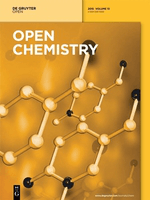
Open Chemistry
Exploring New Horizons in Chemical ResearchOpen Chemistry, published by DE GRUYTER POLAND SP Z O O, is a distinguished peer-reviewed journal that has been serving the global chemistry community since its inception. With an ISSN of 2391-5420 and an E-ISSN also of 2391-5420, this open-access journal has been accessible to researchers and practitioners alike since 2015, ensuring a wide dissemination of high-quality research findings. Located in Germany, specifically at BOGUMILA ZUGA 32A STR, 01-811 WARSAW, MAZOVIA, POLAND, Open Chemistry aims to publish innovative research across various chemical disciplines, with special attention to miscellaneous chemistry and materials chemistry. It is currently ranked in the Q3 category for both fields as of 2023, reflecting its solid standing within the academic community, with specific ranks of 187/408 in General Chemistry and 153/317 in Materials Chemistry, corresponding to respective percentiles of 54 and 51. Open Chemistry not only enhances the accessibility of cutting-edge research but also serves as a vital resource for students, professionals, and scholars seeking to advance their knowledge in the rapidly evolving landscape of chemical sciences.